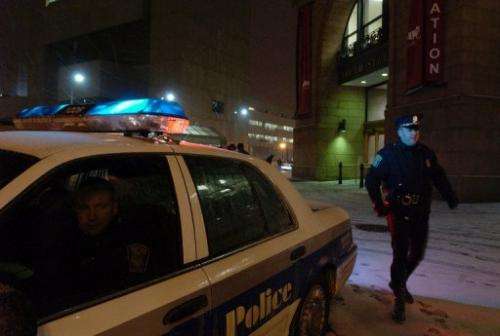DNA links 'Boston Strangler' to final victim

A breakthrough in DNA technology has linked the man who confessed to being the Boston Strangler to the last of the 1960s murders attributed to the notorious serial killer, officials said.
The body of Albert DeSalvo—widely thought to have raped and murdered 11 women between June 1962 and January 1964 but never convicted of the crimes—is to be exhumed to confirm the results, prosecutors said.
"We may have just solved one of the nation's most notorious serial killings," Massachusetts attorney general Martha Coakley said.
DeSalvo was stabbed to death in prison in 1973, when serving a life sentence for rape and other offenses. He confessed to being the Boston Strangler to a fellow prisoner but was never tried for the killings.
However, Suffolk District Attorney Daniel Conley said Thursday that investigators had matched DNA from a relative of DeSalvo to DNA found at the crime scene of 19-year-old Mary Sullivan, who was sexually assaulted and murdered in 1964.
Conley said the test results—made possible by advances in DNA analysis—excluded "99.99% of others in the male population" but were "not sufficient to close the case with absolute certainty."
Accordingly, DeSalvo's body would be exhumed in the coming days to provide a definitive comparison, Conley said, which it was hoped would "prove DeSalvo's guilt once and for all."
Conley noted that DeSalvo's confession to the Boston slayings had been deemed inadmissible by a judge hearing his trial for separate sex offenses.
"That confession has been the subject of controversy from almost the moment it was given," Conley said.
"There was no forensic evidence to link Albert DeSalvo to Mary Sullivan's murder until today.
"Advances in the sensitivity of DNA testing have allowed us to make a familial match between biological evidence recovered from the crime scene and the suspect in Mary Sullivan's murder. That suspect is Albert DeSalvo."
Previous tests of crime scene evidence from Sullivan's murder carried out in the 1990s and 2000 had been unable to glean traces of the killer's DNA but recent improvements in technology had made that possible.
After a DNA profile of the killer was created, detectives were deployed to follow DeSalvo's family. The breakthrough occurred when a water bottle discarded by one of DeSalvo's living relatives was gathered and analyzed.
"That water bottle was tested and the match came back," Boston Police commissioner Ed Davis was quoted as saying by CBS News.
Sullivan's relatives were moved to tears by Thursday's announcement, saying the discovery would bring "incredible closure."
"I've lived with Mary's memory every day, my whole life, and I didn't know, nor did my mother know that other people were living with her memory as well," said Sullivan's nephew Casey Sherman, his voice cracking with emotion.
"It's amazing to me, to understand that today people really did care what had happened to an innocent 19-year-old who was murdered in 1964.
"It's taken 49 years for police to be able to legitimately say they got their man and they will probably be able to say that very soon. I want to thank them for their diligence and persistence in this case."
Between June 1962 and January 1964, 11 women aged between 19 and 85 were raped and murdered in their homes in Boston. DeSalvo, a lifelong offender from childhood, had claimed responsibility for 13 killings.
Tony Curtis later portrayed DeSalvo in the 1968 movie "The Boston Strangler," while the killings also inspired The Rolling Stones hit "Midnight Rambler."
© 2013 AFP













